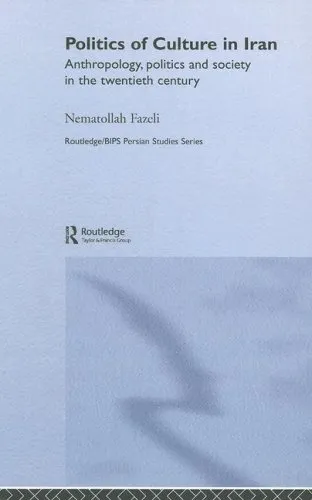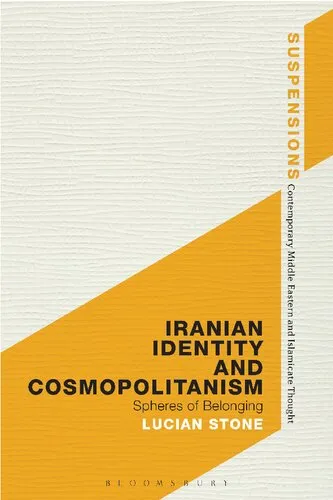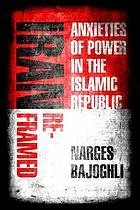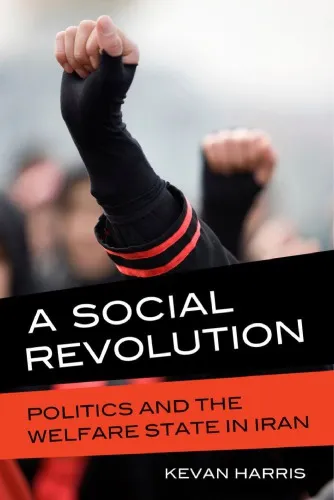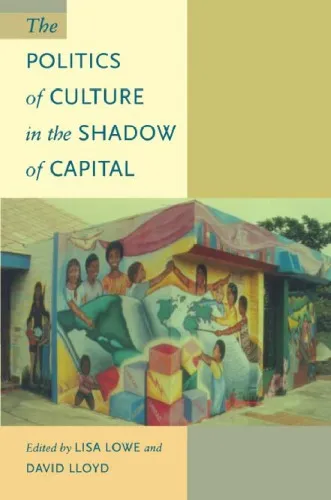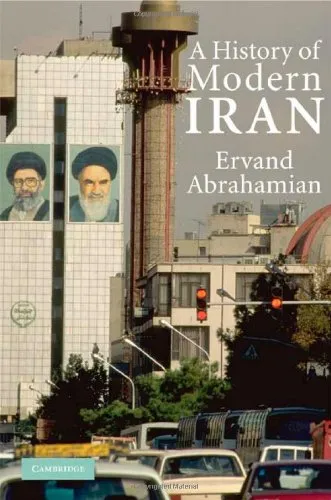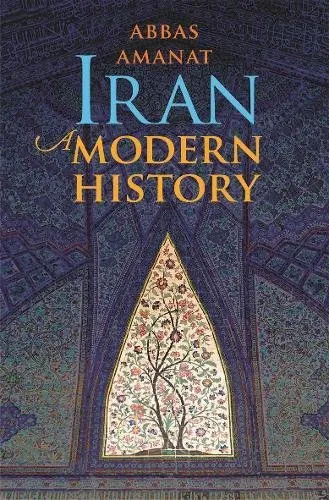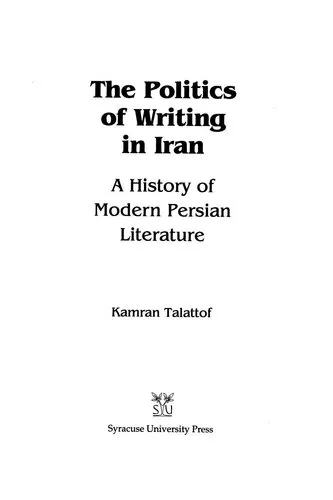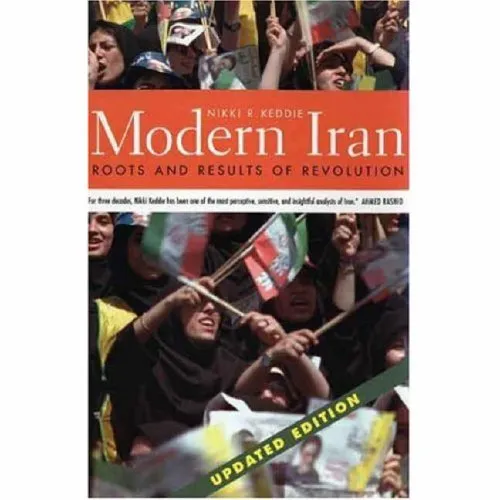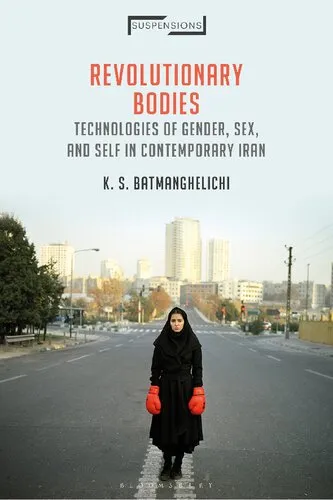Politics of Culture in Iran: Anthropology, Politics and Society in the Twentieth Century (Routledge Bips Persian Studies)
4.0
بر اساس نظر کاربران

شما میتونید سوالاتتون در باره کتاب رو از هوش مصنوعیش بعد از ورود بپرسید
هر دانلود یا پرسش از هوش مصنوعی 2 امتیاز لازم دارد، برای بدست آوردن امتیاز رایگان، به صفحه ی راهنمای امتیازات سر بزنید و یک سری کار ارزشمند انجام بدینکتاب های مرتبط:
معرفی کتاب
کتاب "Politics of Culture in Iran: Anthropology, Politics and Society in the Twentieth Century" نوشتهی نمتالله فاضلی، به بررسی عمیق تأثیرات سیاست و فرهنگ بر زندگی اجتماعی و سیاسی ایران در قرن بیستم میپردازد. این کتاب با استفاده از روشهای Anthropology به تحلیل پیچیدگیها و تغییرات فرهنگیای میپردازد که تاریخ ایران را در این دوران شکل دادهاند. فاضلی با بهرهگیری از تحقیقات میدانی و منابع تاریخی، دیدگاه جامعتری از فرهنگ سیاسی ایران ارائه میدهد.
خلاصهای از کتاب
"سیاست فرهنگی در ایران" در چندین فصل به تحلیل جنبههای گوناگون فرهنگ ایران میپردازد. از اولین رویکردهای مدرنیته تا تغییرات اجتماعی دوران پهلوی و انقلاب اسلامی، نویسنده تعاملات و تضادهای فرهنگی و سیاسی مختلف را بررسی میکند. فاصللی با تأمل در نهضتهای اجتماعی و فرهنگی این دوران، فهم عمیقتری از نقش و تأثیر این تغییرات بر جامعه ایران ارائه میدهد.
کتاب شامل تحلیلهای جزئی از نهادهای فرهنگی، رسانهها و تأثیر آنها بر شکلگیری هویت ملی نیز هست. نمتالله فاضلی با استفاده از شواهد متعدد و مثالهای تاریخی، نشان میدهد که چگونه نیروهای سیاسی و فرهنگی بعضاً با یکدیگر مخالفت کرده و در برخی مواقع موجب تقویت یکدیگر شدهاند.
نکات کلیدی
- تحلیل عمیق از نقش مدرنیته در سیاست فرهنگی ایران
- بررسی تأثیر جنبشهای اجتماعی بر تحولات فرهنگی
- توضیحات جامعی درباره نفوذ نیروهای سیاسی در فرهنگ روزمره ایرانیان
- رویکرد Anthropology به منظور فهم عمیقتری از جامعه ایرانی
نقلقولهای معروف از کتاب
"فرهنگ و سیاست در ایران، همچون دو قطب متضاد، گاهی در حال جنگ و گاهی در همراهی و تقویت یکدیگر، به نوعی قوامیافتهاند که نمیتوان یکی را بدون دیگری فهمید."
"روشهای Anthropology قابلیت آن را دارند که لایههای پنهان و آشکار تعاملات فرهنگی و سیاسی در جامعه ایران را آشکار سازند."
چرا این کتاب اهمیت دارد؟
این کتاب به دلیل تحلیلهای جامعی که از تأثیرات سیاست بر فرهنگ و بالعکس ارائه میدهد، اثری بینظیر در مطالعات فرهنگی و سیاسی ایران محسوب میشود. با تکیه بر تجزیه و تحلیلهای Anthropology، نویسنده تصویری دقیق و کاملتر از تاریخ پیچیده فرهنگی و سیاسی ایران را به خوانندگان ارائه میدهد. این اثر برای پژوهشگران، دانشجویان و علاقهمندان به تاریخ معاصر ایران منبعی است که میتواند بینشهای جدیدی درباره تعاملات پیچیده فرهنگی و سیاسی در ایران فراهم کند.
In the realm of sociocultural exploration, few works stand as comprehensively insightful as "Politics of Culture in Iran: Anthropology, Politics and Society in the Twentieth Century." Authored by Nematollah Fazeli, this compelling text offers a profound dive into the complex and multifaceted intersection of culture and politics within Iran throughout the pivotal twentieth century. With a critical eye, Fazeli dissects the intricate web of influences that have shaped Iranian society over decades, presenting a nuanced narrative that blends anthropology and political analysis.
Detailed Summary of the Book
"Politics of Culture in Iran" embarks on a scholarly journey through the sociopolitical landscape of Iran, decrypted through the lens of anthropology. The book underscores how cultural dynamics influence political transformations and vice versa. It explores the profound effects of modernization, Western influences, and the subsequent cultural reactions rooted in national values and identity. Each chapter intricately details key periods in Iranian history, from the Constitutional Revolution and the Pahlavi dynasty's reforms to the Islamic Revolution and beyond.
Fazeli meticulously charts the role of intellectuals, artists, and the state in crafting a cultural identity that oscillates between continuity and change. By examining educational reforms, media, art, and the shifting role of women, the book illuminates the tensions between tradition and modernity. Through a critical analysis enriched by rich ethnographic data, it becomes evident that Iranian culture is not a static entity but a dynamic force actively engaging with global currents.
Key Takeaways
- The interplay between culture and politics is essential to understanding Iran's historical and modern context.
- Modernization and Westernization efforts have been met with both enthusiasm and resistance by different sectors of society.
- Iran's cultural policy is deeply intertwined with its political agenda, reflecting broader global and regional influences.
- The cultural responses to state policies reveal a resilience and adaptability within Iranian society.
- Gender roles and the place of women in Iranian culture remain pivotal issues in cultural politics.
Famous Quotes from the Book
“Culture is not a passive reflection of political ideologies but an active agent in reshaping political narratives.”
“In Iran, the past dialogues with the present, crafting a future that is neither fully modern nor wholly traditional.”
“Understanding the cultural politics of Iran necessitates a journey into the heart of its intellectual and artistic expression.”
Why This Book Matters
"Politics of Culture in Iran" stands as a seminal work that bridges the often disparate worlds of anthropology, sociology, and political science. This book is not just an academic exploration; it is a crucial resource for policymakers, cultural analysts, and anyone seeking to understand Iran's complex cultural tapestry amidst rapid global change. Fazeli provides readers with a comprehensive framework to appreciate how cultural policies have consistently influenced Iran’s political decisions, societal movements, and overall historical trajectory.
In a world where cultural identities are continuously tested and reshaped under global pressures, this book highlights the critical importance of cultural integrity and self-awareness. It matters because it equips readers with the knowledge to engage critically with Iranian politics and society, offering deeper insights that go beyond stereotypes and generalized perceptions.
دانلود رایگان مستقیم
برای دانلود رایگان این کتاب و هزاران کتاب دیگه همین حالا عضو بشین
برای خواندن این کتاب باید نرم افزار PDF Reader را دانلود کنید Foxit Reader
دسترسی به کتابها از طریق پلتفرمهای قانونی و کتابخانههای عمومی نه تنها از حقوق نویسندگان و ناشران حمایت میکند، بلکه به پایداری فرهنگ کتابخوانی نیز کمک میرساند. پیش از دانلود، لحظهای به بررسی این گزینهها فکر کنید.
این کتاب رو در پلتفرم های دیگه ببینید
WorldCat به شما کمک میکنه تا کتاب ها رو در کتابخانه های سراسر دنیا پیدا کنید
امتیازها، نظرات تخصصی و صحبت ها درباره کتاب را در Goodreads ببینید
کتابهای کمیاب یا دست دوم را در AbeBooks پیدا کنید و بخرید
